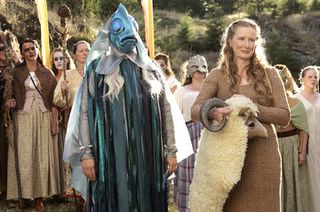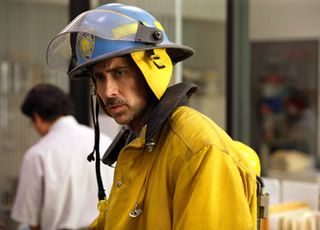Feminist Horror Double-Feature
The 2005 British monster movie The Descent and the 1971 ghost story Let's Scare Jessica to Death should swap titles. The 1971 film, a peculiar and unsettling riff on Polanski's Repulsion, deals with a young woman's tragic descent into madness. And the 2005 film features six girls - one of whom is, in fact, named Jessica - who are scared to death when they encounter some flesh-eating nasties while spelunking in Appalachia. I was going to add here, for comic effect, another example of this happening, two movies whose titles are 100% interchangable. But it turns out that it's not really all that special and could be done with all kinds of titles. Because movie titles are vague and generic: One Good Cop, One Fine Day, A Fine Mess. The Thing! There's a movie called The Thing! But just roll with me here, I needed an introduction.
THE DESCENT
Neil Marshall's film takes forever to get going and then stumbles towards the end, but it largely works as a tense examination of some universal human fears. To be lost, trapped underground, injured, untrusted by your fellows, surrounded by voracious monsters and low on supplies is to be well and truly fucked. Doomed, you might even say. Like Oliver Stone's World Trade Center, a film with which it shares not just a theme but a milieu, Marshall's film drops characters in the midst of a nearly-unsurvivable situation, illustrating their tenacity and will merely by their continued existence.
I've referred to the movie in the title as "feminist" not in any sort of strict, Film Theory way, though I do feel like both of this films could probably be subjected to an enlightening scholarly feminist critique. The Descent is just a movie solely focused on a group of female friends that deals, thematically, with a very feminine strength of will and core toughness. These women strike me as significantly well-rounded - they have attributes we'd consider "girly" (particularly in terms of competitiveness with one another), yet they're plainly badass uber-jocks. Plus, aside from a dead husband, they don't even talk about men very often. Any horror film with three-dimensional women heroes who exist on their own terms like that strikes me as "feminist" in some way.
Despite all the myriad external horrors faced down by its six heroines, The Descent largely focuses on the selfish irrationality of human behavior. "You never truly know someone," the film posits, "until you're trapped underground with them whilst being pursued by angry CHUD."
Each year, Juno (Natalie Mendoza) organizes an "extreme" vacation for her immediate circle of friends. After the last excursion, a white-water river rafting adventure, Sarah (Shauna MacDonald) got into a car accident that took the life of her husband and son. So this year's event, a trek through some unexplored caves in the Appalachian Mountains, is a considerably more somber, emotional affair.
Juno's plan goes wrong immediately. The passageways are hazardously narrow. Rockslides and cave-ins block the only known entrance. Holly (Nora-Jane Noone) slips through a crevasse and shatters her leg. Slowly, old resentments boil up, panic starts to set in and the girls begin to turn on one another. And that's when the voracious, blind, humanoid predators show up.
Marshall excels at building to unanticipated "scare" moments. If you watch enough horror movies, predicting the moment when the alien/creature/monster/slasher will pop into the frame becomes fairly elementary. The Descent rather consistantly manages to subvert these expectations. Marshall will build to an obvious "jump" moment, then hold back, then give it to you 45 seconds later. One scene, among the first clear shots of the monsters, took me completely off-guard and - with the 5.1 cranking and all the lights off - kind of made me lose my shit for a second.
The first half hour takes a bit too long and spends an inordinate amount of time setting Sarah up as a shattered, greiving widow and mother, but this unforced naturalism and character development obviously helps in the second half, when things get gory and chaotic. The Romero-esque insanity of the final 20 minutes, in which a few surviving spelunkers get medieval on some molemen, are worth the occasional slow patch during the set-up.
The dimly-lit cave setting lets Marshall get away with keeping much of the action off-screen, but there's plenty of brutal carnage on display for gorehounds. Plenty. (Close-ups of zombies chewing on living victim's intestines have suddenly become all the rage.) As I said, Marshall kind of loses it at the very end, seemingly unsure of whether or not his Final Girl (to steal a term from Carol Clover) deserves a happy ending. This just doesn't strike me as the kind of movie that needs a confusing, ambiguous conclusion. They all live or they all die. Simple, cold, efficient.
LET'S SCARE JESSICA TO DEATH
John Hancock's low-budget 1971 film, on the other hand, had no choice but to end ambiguously. The Big Question driving the film is the lead character's sanity. Is Jessica's house really haunted by the ghost of a 20 year old girl who drowned there 100 years ago? Or is Jessica just going insane again, concocting the film's scares in her fevered mind? By the conclusion, it's absolutely certain that Jessica has been scared - perhaps fatally? - but has she been doing it to herself the entire time? And if so, how are we complicit? (As in "Let us scare Jessica to death.")
Jessica (Zohra Lampert) has just been released from a mental hospital following a 6 month stay. She doesn't tell her doting husband Duncan (Barton Heyman), but she's still hearing voices, voices reminding her that they will never go away. They've just dropped their life savings on an old isolated house near an orchard, which they promptly move into along with Duncan's hippie friend Woody (Kevin O'Conner). No sooner do they arrive than they encounter Emily (Mariclare Costello), a drifter who has been squatting in their new home.
The town around the apple farm is not exactly sprawling, and the local citizens (all men bearing hideous deformities and scars) are not exactly inviting, so Jessica and Duncan wind up spending most of their time home alone. Why Duncan thought this set of circumstances - utterly alone in a farmhouse with an infamously grim history - would benefit his already ailing wife is unclear. In point of fact, the house's former tenants and gruesome legacy weigh heavily on Jessica's head, along with the paranoid fear that her unnamed "illness" (probably schizophrenia) has returned.
Hancock's film captures a specific, creeping fear particularly well: the fear amongst those who have been sick that their illness will return. Jessica is driven crazy in some ways by the fear of going crazy. She gives herself freely over to delusional paranoia and depression because she believes these symptoms are her destiny.
Duncan and Jessica meet with a local antique dealer, trying to sell some of the old items from the house's attic, and thus hear the story of Abigail Bishop, a young woman who drowned in their very cove. One photo of Abigail remains in the house, slipped behind a valuable old silver frame, and she closely resembles Emily. Could this mysterious stranger actually be a spirit trapped in the house, and is she sending secret messages only Jessica can hear? Or does it simply seem that way because we view the film through Jessica's eyes, and she's crazy?
I brought up the Polanski film as an obvious predecessor to Let's Scare Jessica for a few reasons, all of them thematic. In truth, the Hancock's style and tone (not to mention his title) owe more of a debt to the Italian horror films of this time period, amny of them focused on innocent women trapped in haunted houses with violent pasts. Carole (played by Catherine Deneueve in Repulsion) and Jessica share a phobia of excessive male attention and disgust at the leers an attractive woman receives in public. The men in the town, who seem at first to be rude because of identity politics (expressing distaste at the new hippie neighbors), come to seem like a zombified mob of brutes in the grips of some kind of carnal frenzy. Both eventually act on their (somewhat) delusional phobias by brutalizing the men in their lives.
Hancock's larger point seems to relate to male possessiveness over women. Jessica is obviously sick, which Duncan attempts to remedy be re-establishing his ownership of her. He's in essence removing her from the hospital and any other familiar environs and stowing her away in an isolated country house. Emily, if she is really a ghost or reflection of the long-deceased Abigail, lives out the 1971 equivalent of a homemaker's nightmare - she's literally trapped inside a big house, dressed in a wedding dress, with no hope of escape EVER. Even the ghostly voice that calls to Jessica gives her instructions designed to incapacitate her free will. "Stay with me." "Come to me." "Never leave me, Jessica."
Sure, it's a bit reductive, but it's still pretty entertaining as far as haunted house movies go. Not to mention creepy. Hancock really uses the whispery ghost voices to chilling effect, placing them at random unexpected intervals and giving them an increasingly erratic, screechy, almost hostile timbre. Robert Baldwin's synthetic, tinny score adds to the atmosphere of woozy, disoriented anxiety.
The biggest flaws are exactly what you'd expect from a low-budget 1971 horror film. Several scenes ramble on without developing, including far too many musical montages of Jessica running around the woods near her home in a daze, and the performances are amateurish and disconnected. Still, this is a far better-than-average horror oddity worth a second look, and freshly available on a very nicely-remastered DVD with a nice, bright, anamorphic picture.




